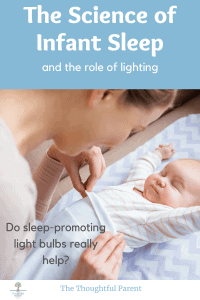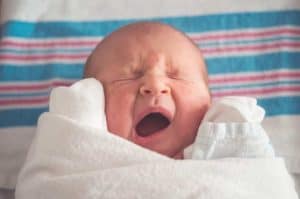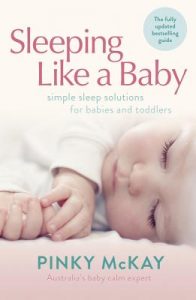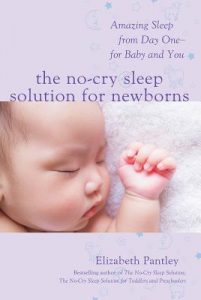I was so sleep deprived that I could hardly lift my head off the pillow in the morning. My hands shook at times and to say I was “edgy” was an understatement. My youngest son was 2 months old and I knew it was too much to expect him to sleep through the night; he was just too young. I would be happy if he would just sleep for more than one hour…and preferably that hour not be with him on my chest or me constantly bouncing him. I had heard of some kind of sleep-promoting light bulb and wondered if it might help.

*This post contains affiliate links. Purchasing through these links provides a small commission to me (at no added cost to you).
The Science of Baby Sleep
I was desperate for any help. I Googled every combination of baby sleep terms that I could think of. Then I ran across an article that mentioned the importance of the production of hormones, especially melatonin, in infants. It explained that babies’ circadian rhythms are not well-developed at birth. Additionally, they don’t really begin producing the sleep hormone melatonin until they are around 3-4 months of age. This really helped explain his sleep patterns and why I was struggling so much.
Okay this is fine, but how can I use this information to help my situation, I thought. Well, some research has shown that exposing babies to natural light during the day and keeping things dark at night actually helps them regular their circadian rhythm and kickstart melatonin production.

You can guess what we did the next day. We spent as much time outdoors as possible, especially early in the day. It turns out April is a lovely time to have a baby in Colorado. By the time he was 2 months old, the weather was just warming up enough to bring out a blanket and lay in the grass looking up at the clouds. His big brother and I would gather snacks and head out to the sunny front lawn with his baby brother.
I can’t say there was a miraculous turn-around with his sleep patterns, but gradually by 4-5 months he was sleeping slightly longer stretches. Those sunny mornings, however, did wonders for me and big brother. The sun and a bit of exercise really helped my mood and helped keep my older son occupied.
What happens, however, if your baby is born in December when the days are short and sunny mornings are hard to find? There is some evidence that babies born in the winter months tend to produce melatonin at a slower rate in those early months. However, by 16 weeks of age, these differences all but disappeared.
Sleep-Promoting Light Bulb: Fact or Fiction?
For those winter babies (and really all of us), scientists are learning new ideas that are influencing new products to help. We know that natural light can help with the establishment of circadian rhythms, but what about artificial light? We’ve all heard advice from sleep experts about not having brights lights, TV or cellphone lights on when you are preparing for sleep.
Why is this? It turns out that when our brains are exposed to the blue end of the light spectrum (which is most present in traditional light bulbs), it suppresses the release of melatonin. This has the potential to affect babies, young children, and adults.
Now a new sleep-promoting light bulb, like the Nite-Nite Light is aiming to help reduce this blue light and aid in sleep regulation. These amber-colored bulbs are designed to cut out most of the blue light and get your brain ready for sleep. This is the same type of technology that NASA used to help astronauts get some shut-eye while traveling in space.
*we received light bulbs in exchange for an honest review
We have been trying out a couple of these sleep aid light bulbs in our home for about a month now. I have one in my elementary-aged son’s room for us to read at night before bed. I can’t say that I’ve noticed a huge difference in his sleep patterns, but he was a good sleeper before this anyway. I will say it does emit a nice warm light that is dim but still possible to read by.
I gave another set of sleep-promoting light bulbs to a mom friend who has young children too. She put one in her toddler daughter’s room. Before this, her daughter had had difficulty going to sleep at night and they would find her up out of her bed several times while they were still up in the evenings. They put the new sleep-promoting light bulb in her room and she really liked her “special light.” This dim light allowed them to also close her bedroom door all the way (which had previously remained open to allow a little light in) but leave the “night-night” light on.
According to my friend, this new combination of lighting and routine has made a big improvement in her daughter’s sleep. She now goes to sleep easily and has only rarely been waking up during the night. As with much science, there is no definitive way to know if the light bulb itself prompted these better sleeping habits or if it was the change of routine in lighting or some other factor. However, it is encouraging to see how refreshed and well-rested both mom and daughter are now with this new situation.

As parents, we all know sleep is a huge part of our lives–especially if we or our children are not getting enough. Sleep-deprived parents are more likely to lose their temper with their little ones. Kids who do not get enough sleep are more likely to struggle academically and trouble regulating their emotions.
Related reading: Research Reveals the Real Reason Why You’re Losing Your Temper with Your Toddler
Although the science behind a sleep-promoting light bulb is still fairly new, it seems plausible that technology like this could help adults and children with establishing good sleep habits. Whether it be light bulbs or simply turning electronics off near bedtime, helping our children learn how to “power down” their brain for sleep is a lesson that will benefit them for a lifetime.
Related Resources:
 Tender Beginnings: My book for moms with new babies
Tender Beginnings: My book for moms with new babies
Helpful advice about babies’ development, sleep, mom life and more!





Leave a Reply